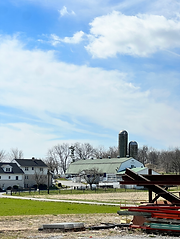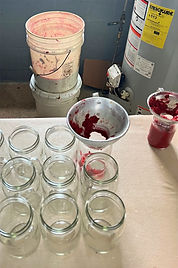




FIRST-HAND EXPERIENCES WITH A DEVOUT AMISH FAMILY
Driving down a rural, Pennsylvania road, it becomes apparent a different world awaits.
Gas stations become less frequent, 7-Elevens have vanished, and the only businesses along East Lincoln Highway are small, Amish-owned bakeries, restaurants, furniture/antique shops, and repair facilities.
As my red Jeep zips along the road, topping speeds of 50 miles per hour, horse and buggies to the left of me take my same route - but at a far slower speed.
The juxtaposition of this environment is stark and startling. The GPSes mounted firmly on the dashboards of passing cars, vs. the Amish buggy drivers’ maps. The men in all black strolling, with their cattle down a seemingly never-ending field, a block over from families in their designer sweatshirts, buying gum at the store.
I have never experienced a world quite like this. A world so grounded in the year 1723, when it is 2023. A world that blends with modernity, (What choice is there? Flocking tourists bring Lancaster County approximately $2 billion dollars, each year,) against its better judgment.
But, just when things could not seem more peculiar, my destination appears on the left–Irishtown Shop, owned and operated by Samuel Stoltzfuz, locally known as Pud.
I mistakenly take the small, ranch-style house in front of me for his. But, in actuality, his house, business “office,” (an area with no bathroom, no frills, and leads directly into another work area,) and additional working quarters are on the land - off the road.
I turn my Jeep onto a dirt path that leads uphill, onto a huge patch of grass. I catch Sam’s daughter, Linda, before she heads into the fields, with a small bucket. Dressed in a modest black dress, and a gray headscarf, she fetches a frazzled Sam, who is not quite ready to speak with me.
“You said 1:00, and it is 12:30. Please come back at one,” he yells out, in a bewildering tone of politeness and frankness.
Returning at 1:00 sharp, I am not sure what kind of conversation awaits me. Over the phone the word “interview” put him in immediate defense mode. And, based on our brief interaction at noon, I am not sure if he is even friendly.
However, after spending over an hour with Sam, on his remarkable property, it is safe to say that he is not only polite, but one of the most fascinating men I have ever met.
Oh. And, as for the lack of manners, and formalities, I quickly realize that this is, simply, the Amish way. The Amish have no time to interpret social cues, or thank you for complimenting them. They live life completely matter-of-factly; devoid of any emotional range, or desire to personally connect with the English, (what the Amish refer to outsiders as.)
The Amish believe in three things: God, work, and their families.
Did I mention work?
The second I walk into his small, self-made shed, I am not greeted with a “Hello,” or, “How are you!” I am greeted with “This is my original horseradish. It comes in small and large. This red one here is beet horseradish…” His soliloquy comes at me like a freight train. He clearly was a man who cut to the chase.
Devoid of all formalities, and usual small talk, I was stunned by this man’s fast, Pennsylvania-Dutch twanged drawl.
He was not mean. He was not rude. He just was.
He displayed in the first five minutes of our meeting a new personality trait I call politeness, with no manners. Sam would not apologize if he cut me off mid-thought. He did not thank me when I complimented his home. In fact, the only adjective I heard him utter the entire hour I spent with him, was the word “beautiful,” which he used to describe his wife.
That’s it.
I quickly adapted to this new style of conversation. The thoughts darted around his brain at the speed of light. I could barely keep up.
“I type up [writing pieces] for a local publication on my computer. I’ve written about my trip to Europe, and even have a book of my recollections published, (What It’s Like to be Amish.) I want to show you where we grind the horse radish. And, the comfort tops my wife makes. Do you need a bathroom? Let’s go out to the attic. And, let me show you how I grind the horse radish,” he said in one stream of consciousness.
Sam was such an intelligent man. His raw intuition took his eighth grade education to soaring heights. In meeting this follower of the Old Order Amish tradition, I found a man ambitious to thrive. Even if his definition of prosperity differs from mine and yours.
I don’t know many college graduates who have had a shed-building business, an existing horseradish business, a semi-professional journalism career, a published book, a hand in his daughter, Linda’s dog breeding business, and, also, moonlight as an administrator for the local cemetery, with the massive scrolls of paper to confirm it. Of course, the names and records are not digitized. On his laptop, Sam only knows how to type, using a word processor that looks like a 1980s version of Microsoft Word. Sam has no idea how to surf the web, and claims he wouldn’t, even if he could. However, in a few minutes, he gives me numerous reasons to refute that latter claim…
Then, just before being escorted to that second attic workshop he was telling me so much about, (which is located above yet another small, carpentry workshop,) we passed by his neighbors’ working quarters. They are connected to his property, cementing another Amish motif I have heard so much about: community.
The 400 acres of green pasture before me is shared not only by Sam and members of his family, but by distant kin, and friends, alike.
One gets the feeling that they have entered a utopian commune. One that seems to actually work.
They live off the land together, worship together, share wealth and property with one another, and do not let one another fall. If one’s business begins to falter, the church officials will bail it out. If someone is in need of transportation, neighbors will arrange a car for them. It is an amazing trait, but, also, upon further research, a quality they use to further isolate themselves. Any way they can avoid government assistance/interference, or any non-business related contact with “the English,” is their preference.
This members-only utopia seems a little like a friendly, devoutly Christian mob. Not in the criminal sense, of course. But, in the way they rely so strongly on one another, have a deep fraternal/sororal bond, speak seldomly to non-Amish people, and would rather die than get involved with government officials.
As I continued to stroll along the dirt paths, we pass young girls and boys, heading into the fields. They are hoeing the land, gathering roots and vegetables, and tending to crops. Their purpose was clear. Who knows who they were, but they had a look of belonging on each of their faces.
My traveling companion and I, (aka my mom,) finally reached the attic. We were met by the smell of beautiful hardwood floors, and Sam’s fast-talking explanations.
In that attic I learned that Sam does not believe in using computers, but desperately yearns to use them. He does not believe in modern innovations, (he laughed hysterically when I asked if he got to Europe by airplane. “Absolutely not. We took a boat,”) but wants us to set-up a WI-FI connection on that worn, 15-year-old, Dell laptop. He believes life is about labor and simplicity, but asks to stay at my home this summer, to rest, on a Fire Island vacation.
While there is absolutely nothing odd about Sam’s behavior to me, as I vacation, travel, and use technology, it is odd for him. He is a walking contradiction in every sense of the word. A man battling his stringent religious beliefs, with his desire to be a part of the 21st century. I’ve never witnessed such a battle, even though to him, no battle was being fought.
Sam, very matter-of-factly, was Amish, and just so happened to simultaneously want the names of small hotels on Long Island.
His 15-year-old grandson, Sam David, was another experience to behold. He walked up to the attic, unexpectedly, as Pud was discussing how his friend, David, owns a bookstore, and may be able to connect his computer to the internet.
Sam David looked at my mom and I, like he had just seen two ghosts. He put his hand up to greet us, and did not even wave it. I found it strange that Pud did not bother to explain why we were there, and, instead, acted like two random women standing in his attic was business as usual.
Sam David’s Pennsylvania-Dutch accent was even stronger than his grandfather’s, something I attribute to his young age. At 15, he is already done with his education, and works the land with his family. However, he is too young to have any outside business pursuits, and as a result, he is speaking English less frequently than his older relatives.
It occurs to me that my mom and I may be the first non-Amish people he has ever come across.
He spoke very little, and was slow in movement. He was a very shy, soft-spoken boy, who did not wish to step on any toes. His reserve was extraordinary.
But, then something shocking happened. When Sam David heard we were trying to help his grandfather connect his computer to the internet, he lights up, and proclaims, “I’ll be right back.”
He scurried away, and I had no idea what was going on.
Sam David comes back two minutes later with an internet modem. The elder Sam didn’t even know he had one in his house, let alone what it was.
Pud eagerly supports Sam David’s pursuits, and within 10 minutes, the young boy with an eighth grade education, who is not even supposed to use a computer, (as he has no business interests that would sanction one,) connects the Dell to the internet.
Sam David turns around, now, facing us.
“How do I open a website?”
"He had just seen two ghosts..."




